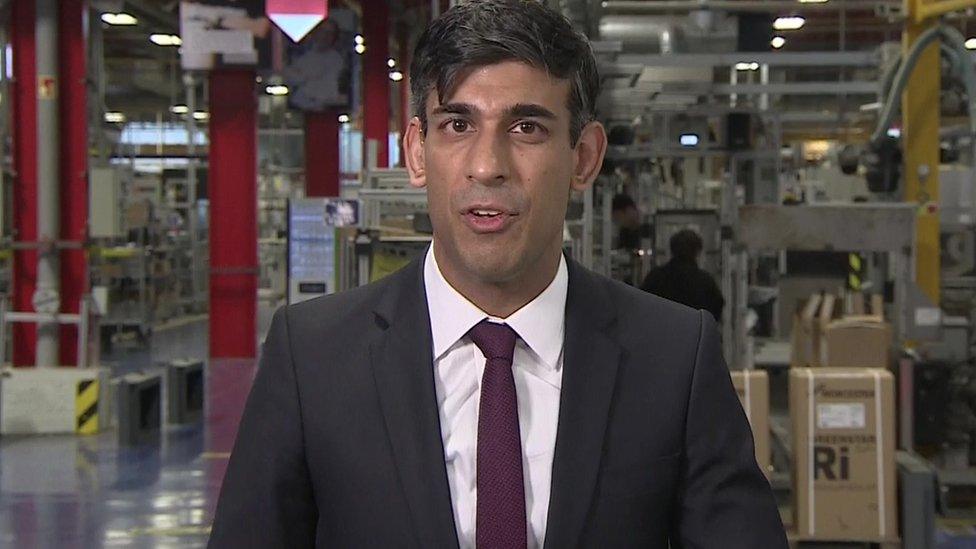Midlands glimpses the new abnormal
- Published
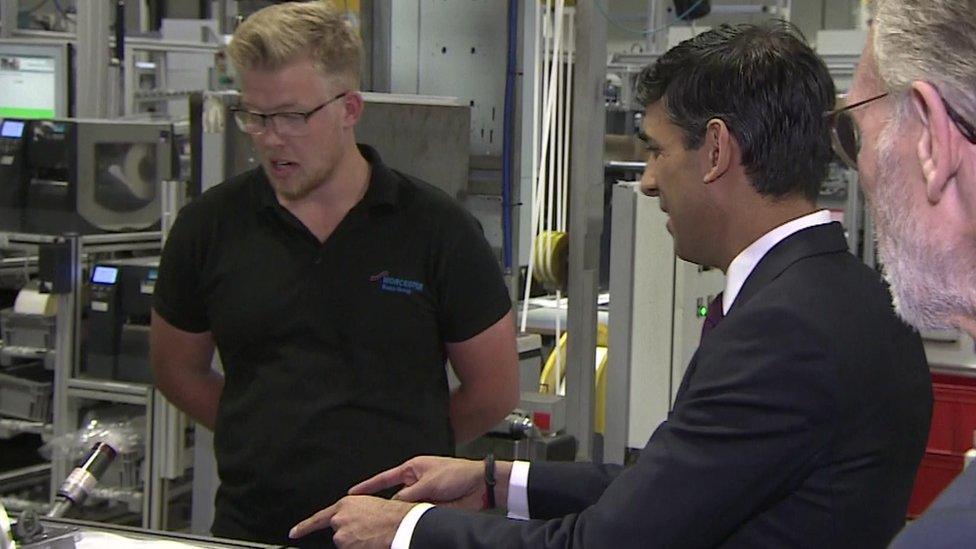
Chancellor Rishi Sunak visited the Worcester Bosch factory on Thursday
'The health or welfare of the people should be the supreme law'
It is two months since Boris Johnson quoted his hero, the Roman statesman and philosopher Cicero, to fend-off initial demands for an early easing of the lockdown to limit the economic damage.
Paradoxically, it is just as transmission rates are deemed low enough for him to change his tune to the more upbeat "enjoy summer safely" message, that the grim financial cost of that 13-week standstill is becoming painfully clear.
What use is it for ministers to exhort us to shop til we drop, to "eat out to help out", if our shops and restaurants are closing down?
The Chancellor Rishi Sunak came to Worcester to celebrate his £30bn midsummer package of employment protection and job creation measures.
But even while he was touring the city's famous boiler factory, retail giants including Boots and John Lewis were announcing 5,300 job losses.
Never knowingly understated, Mr Sunak's prediction that "more hardships lie ahead" could hardly have been more emphatically thrown back at him.
Next day in Birmingham, the Shadow Chancellor Anneliese Dodds told the government it must do more to help regional high streets and to keep shops like John Lewis in our local communities whenever possible.
'Dreadful mistake'
The eight John Lewis stores earmarked for closure include not only its Tamworth shop, which only opened in 2011, but also its gleaming showpiece in the £150m Grand Central development above Birmingham's New Street Station.
That opened in a blaze of national television, radio and newspaper coverage more recently still, in 2015.
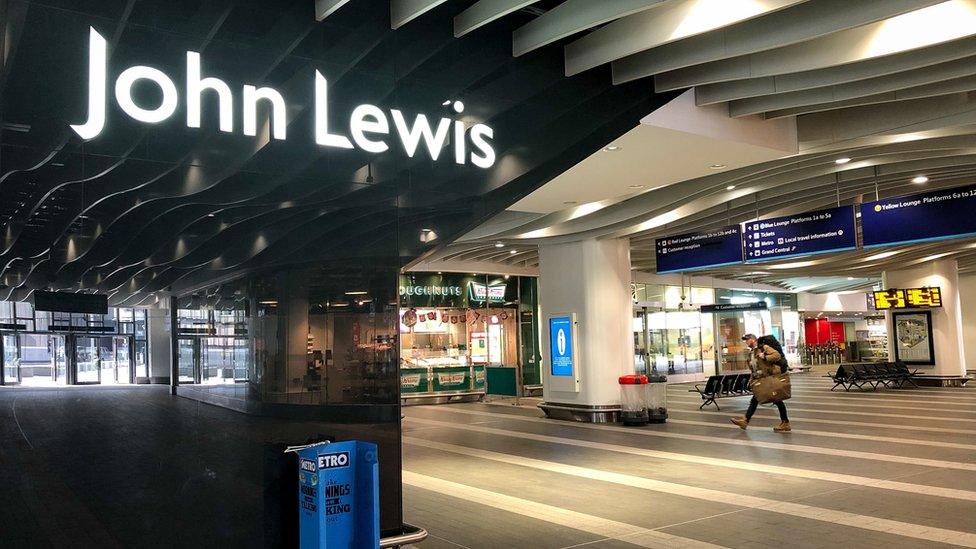
John Lewis is planning to shut down eight stores, including its Birmingham department store, putting 1,300 jobs at risk
The partnership's then chief executive declared it was "a bold expression of the very best of John Lewis" demonstrating it was "firmly committed to the British high street".
Just five years later, that same Andy Street, now Conservative Mayor of the West Midlands, says its closure would be "incredibly disappointing" and "a dreadful mistake", while admitting that, of course, he no longer inspects John Lewis Partnership's books.
The Times business journalist Ashley Armstrong reports that many insiders always saw the Birmingham "anchor" store as Mr Street's "vanity project" and that under its new management, the business has had to move fast to cut its post-Covid losses.
Armstrong concludes: "Grand Central station was a driver of footfall, but with people working from home the number of shoppers coming off the trains has dried up. The closure may also have been been influenced by the impending start of a clean air zone in the city centre".
This begs one important question. Is this drying-up of train passengers, the growth of home-working and, with it, the further acceleration of shopping online, a permanent effect?
Just a phase we're going through?
It lifted my spirits during one of my lunchtime strolls recently to watch the building work ramping-up in Birmingham once again.
Construction of the Metro extension towards Edgbaston, the enlargement of the foyer area at Symphony Hall and, looking increasingly like our own version of Canary Wharf, the imposing office developments taking shape on either side of HSBC's UK Headquarters in Centenary Square.
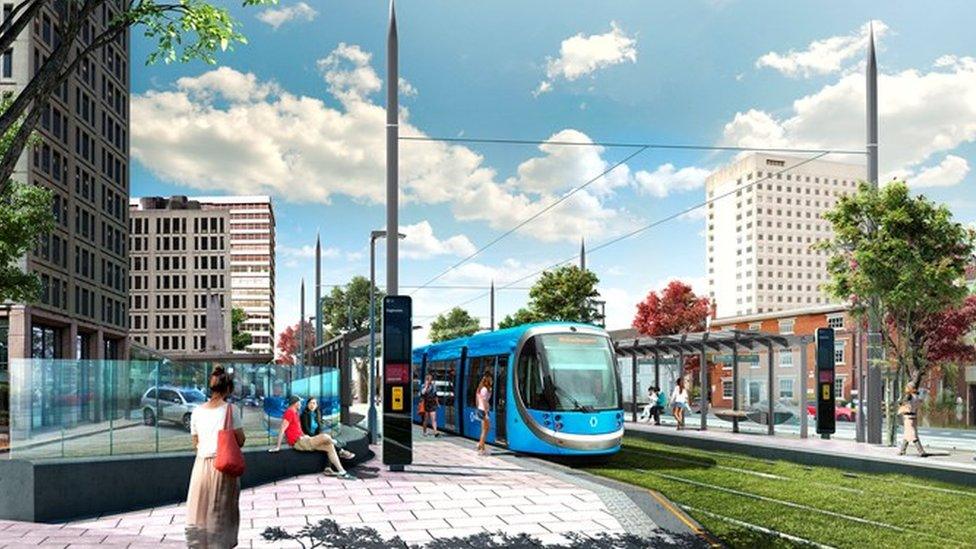
An artist's impression shows how the Edgbaston terminus on Hagley Road should look once completed
Then the "what ifs" kicked in.
What if people never return to the city centre in such numbers to ride the Metro to the shops, to join their colleagues in those expensive offices or to enjoy a symphony concert with a packed audience and a large orchestra playing Beethoven or Tchaikovsky?
Until then, an extended foyer is about the last thing anybody needs. Even this autumn's Conservative Party Conference, where it had been due to make its debut, is to become "a largely virtual" affair.
It's all so much doom and gloom.
"No it's not," replies a friend of mine who has worked for many years in the field of regional regeneration, or "regen" as he calls it.
He is full of vim and vigour after Boris Johnson's announcement of an £84m boost for the West Midlands, external in his "build, build, build" package announced last week in Dudley.
'Growing faster'
My friend is convinced Birmingham is still set to benefit from the continuing exodus from London, because of spiralling office and living costs in the capital. And if our cities really are becoming as much about socialising as commercialising, then concert halls, theatres and restaurants still have their best days ahead of them.
More boosterism comes from the Chief Executive of the Greater Birmingham Chambers of Commerce, Paul Faulkner.
He writes in the Birmingham Post: "The region was growing faster than anywhere else outside London when the pandemic struck and we aim to retain that status".
He has joined the Economic Impact Group, chaired by Mayor Street, which is now working on a 10-point recovery plan.
"This is key to the future for the West Midlands," he goes on, "by working together to seize the opportunities that come from recovery, investing in new markets and upskilling".
Mr Faulkner points out that the 2022 Commonwealth Games in Birmingham will give our region a timely boost as well.
Keeping track of the West Midlands economy feels to me like riding an accelerating rollercoaster. We can expect plenty more stomach-churning twists, turns and dives before we return to anything remotely resembling solid ground.
It's the new abnormal.
- Published9 July 2020
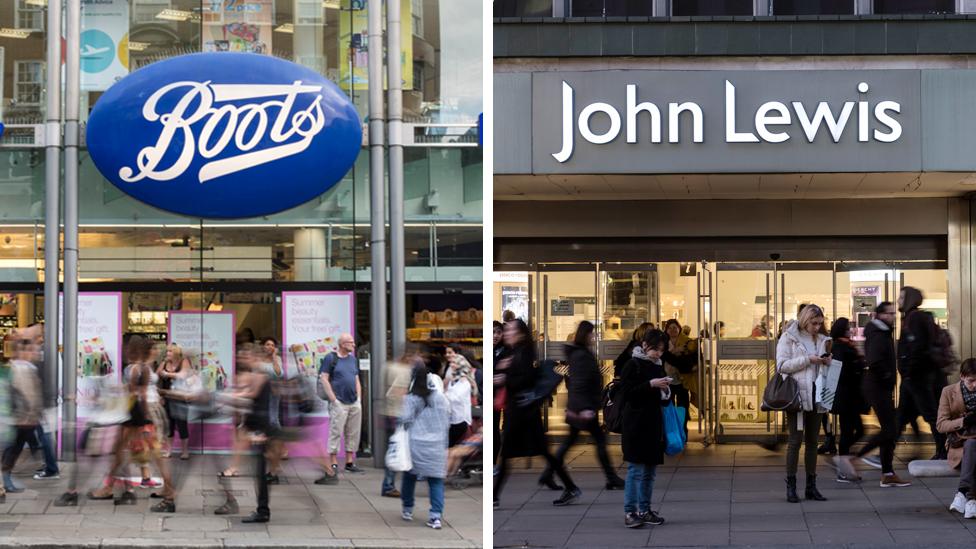
- Published23 May 2024

- Published9 July 2020
